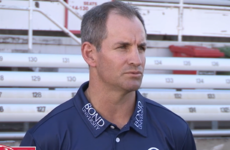RUUD VAN NISTELROOY stayed on his knees, eyes shut tight yet pointed up beyond the fist-filled air as he unleashed one more guttural roar of relief to add to the cacophony of 65,000 others.
For the Dutch striker, the coolly taken penalty was both personal redemption and the resolution of his team’s problem. The previous year, he had the chance to kill Arsenal’s unbeaten 2003/4 season at its root down the other end of Old Trafford. And, instead, punched his spot-kick against the crossbar.
This time he maintained impeccable poise and left a 17-minute countdown running on the Gunners’ incredible 49-game unbeaten run.
For all sport-lovers, this is the way that astounding streaks should end. A break of tension for one side, a boiling point in a bitter rivalry, schadenfreude and joyous relief. The saga almost didn’t need the Battle of the Buffet to embelish of the tale. But, like extra pepperoni, it only left more to savour.
Our low-tech, high-assumption projections for this point in the rugby season – ignorant as they were of the looming pandemic – suggested that Leinster would today ring up a 23rd win on the trot and turn thoughts to their toughest match of the season, against the very team who last managed to beat them.
Leinster’s actual winning streak, dating back to the tail end of last season, was halted at 21 by the postponement of the Pro14′s season. The Champions Cup followed suit and now nobody can say with any authority when that mouth-watering quarter-final clash with Saracens might come – if it is to be played at all.
It should go without saying that all this talk of sporting what-ifs is mere whimsy when there are matters of actual life and death afoot. Even more pointless, as Leo Cullen continually suggested, than chasing a winning streak when there were tangible trophies to target instead.
Still, it was an outstanding feat to trundle through 21 matches without a blemish. Not only because the record-setting run came hand in hand with home and away victories over Glasgow, Northampton, Lyon, Connacht, a win in Thomond Park and gave a sense of clockwork routine to bonus point home wins.
More impressive was the style of their victories and the way in which Cullen and Stuart Lancaster were able to put out a side to play with a seamless rhythm despite constant change in personnel.
51 players were already used by the eastern province through this season’s 19 games, their depth tested and commended by extended international windows for both the World Cup and the Six Nations.
Caelan Doris went from hot prospect to being a core international. Will Connors tackled his way through Leinster’s tougher away trips to take a regular slot in Ireland camp. Ciaran Frawley and Harry Byrne shared the task of deputising for the latter’s big brother Ross and Ryan Baird continued to look like a grown man playing age-grade rugby.
It was all coming together to form an irresistible blue wave rushing towards a formidable seawall in Saracens. Yet the postponement of sport means that all that momentum is lost, all the natural rhythm and order of the season is gone and so whatever end the current campaign comes to, all titles and records will carry a gaudy asterisk.
The natural rhythm of a season defines how we consider a winning or unbeaten run. If the rugby schedule cranks into gear again there is no telling what sequence matches will be re-positioned into. The Pro14, to their credit, were one of the first organistations to categorically clarify that a cancelled match would ring up a default draw. We must expect a handful of fixtures to go that way.
In Leinster’s case, such an event would barely chip at their 20-point lead in Conference A, but what a bloodless coup it would be on their winning streak.
Or perhaps, they would be caught cold on the field, with – as has afflicted them before – one eye on a much bigger match seven days ahead.
Curiously, the streak Leinster eclipsed to set a new club record in January was also set in an oddly shaped season influenced by postponed Six Nations fixtures. In 2001/2002, Matt Williams’ side ploughed through the Celtic League and claimed the trophy with their 100% record in tact. Then Christmas came, professionalism went out the window and, after scraping victory over Newcastle in Leeds (a match postponed and moved due to a frozen pitch), the 15-game streak was capped by a rampant Toulouse.
For 2020 Leinster, there may be no climax, one season may very well bleed into another, there won’t be the emotion of Van Nistelrooy or the sort of grim tension that caused Robert Pires to routinely run the ball to the corner flag to maintain Arsenal’s ‘Invincible’ status.
That said, finding new ways to impress has been a hallmark of Cullen and Lancaster’s side throughout the 21-match (and counting) streak.













It wrecks my head that Stephen Ireland scored the first goal for Ireland in Croker. I couldn’t think of a player worse than him to score it.
@Ned Flanders: Roy Keane would be a good candidate for you.
18/20, not too bad, definitely guessed a couple.